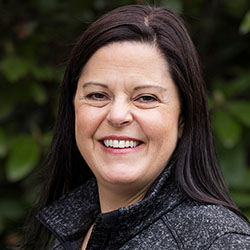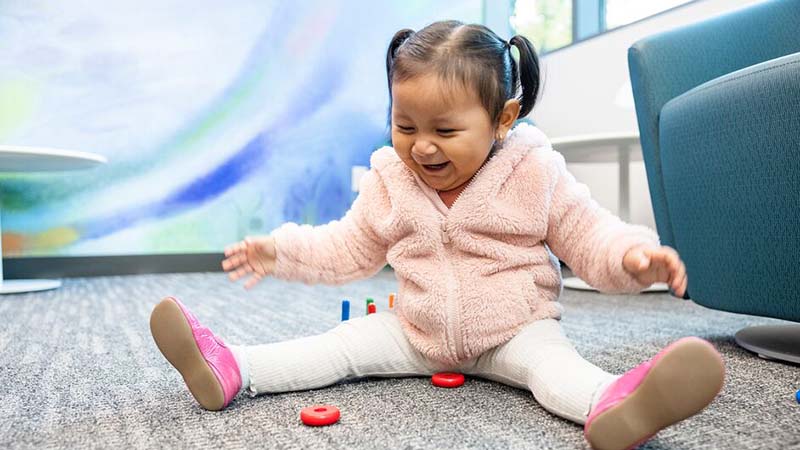ABA Early Intervention Program
What is the ABA Early Intervention Program?
Our ABA Early Intervention Program is an intensive, short-term program for families of young children with autism spectrum disorder. ABA stands for applied behavior analysis. This therapy helps kids with autism learn skills to increase positive behaviors (like communicating) and reduce challenging behaviors (like tantrums). This program is only open to families whose primary form of insurance is Apple Heath (Washington Medicaid).
Kids up to age 6 come to the program 4 days a week for 12 weeks, either morning or afternoon. Behavioral therapists and a speech and language pathologist (SLP) work with your child to build their skills. While your child gets high-quality therapy, you and other caregivers will learn from behavior therapists, SLPs and family advocates:
- New ways to communicate with your child
- Skills to help your child learn
- Skills to understand the reasons for your child’s challenging behaviors and how to help them
- What services your child needs and how to find them
The program takes place at Seattle Children’s Autism Center.
How will the ABA Early Intervention Program help my child?
Therapy and support at an early age can have a direct effect on your child’s brain development. This can change the course of your child’s life. With early and intensive therapy, your child can communicate better. It will be easier for them to let you know basic things like what hurts or what they want. This reduces challenging behaviors and boosts your child’s ability to learn.
We help children get ready to take their next steps in the community — like starting daycare, school or a long-term ABA program. Based on your child, this could mean teaching them to communicate, follow verbal instructions, interact with others, reduce challenging behaviors, increase self-soothing actions or become toilet trained.
At the start of our program, many children have little ability to interact. By the end of 3 months, almost all children can ask for help or let a caregiver know what they want. In the program we:
- Assess your child’s learning needs.
- Teach skills that help your child be ready to learn, such as sharing interests with others, imitating others or responding to words.
- Work 1-on-1 with your child to improve basic skills. These include communication, play, self-care, learning and social skills.
Read Changing the Trajectory, the story of how ABA helped Aliya and Kira.
-
Therapy based on research
ABA therapy is a way to change behavior in everyday life. It helps increase positive behaviors or skills (like communicating and interacting with others) and reduce challenging behaviors (like tantrums).
Our therapy space is set up like a preschool, and during therapy we follow a routine like preschool. Our behavioral therapists and SLPs work 1-on-1 with each child in the classroom.
The behavior therapist’s job is to figure out why your child has certain behaviors and to teach them new skills. Perhaps a tantrum serves a child because it gets attention or gets them what they want (such as a favorite toy). The therapist creates a treatment plan based on what will motivate your child to choose better behaviors. Each child’s plan is different. For example, if a child has a tantrum because they want to stop an activity, the therapist rewards the child for asking to stop instead of having a tantrum.
-
Learning to communicate
Many children start our program with limited communication skills. The SLP takes time to understand your child’s communication abilities and expand them.
The SLP works with your child’s behavior therapist. Together, they help your child build skills that lay the groundwork for communicating (using words or other strategies like pointing). These skills include focusing attention on the same object as another person (joint attention), understanding simple instructions and basic concepts and playing.
The SLP also suggests communication strategies you can use at home. Helping a child communicate often eases frustration and improves their behavior.
The SLP consults with you and the rest of the ABA Early Intervention team on your child’s care. This does not take the place of 1-on-1 speech therapy, which your child may also need.
-
Building skills for parents and caregivers
In a weekly parent education group, you will learn:
- Ways to help your child build social and communication skills using play and common routines
- How to reduce challenging behaviors
- What public services are available for children with autism and how to get them
Each week, you will spend time in the classroom working with your child and their therapist. This helps you better understand what your child is doing and how their therapist helps them. It also gives you a chance to try the methods we use and practice along with the therapist. You and other caregivers can use these methods at home. Our staff always describe what they are doing while working with your child so you can learn about what you are seeing.
You will also meet regularly to talk with a parent educator. The topics depend on the needs of your child and family. You can talk with the parent educator about any concerns you have. Common examples include:
- Feeding problems
- Toilet training
- Challenges with siblings
- Behavior challenges at home
- Sleep
-
Helping you get resources for your child
We will pair you with a family advocate to help access resources for your child and your family. We help you find the services you need outside our program. The family advocate can help you:
- Connect to services and supports you need, such as help paying for food or transportation or mental health services for parents
- Follow up on recommendations or referrals from your child’s team, including for long-term ABA when your child completes our 12-week program
- Set up an assessment with your child’s school district and get enrolled in preschool
- Fill out paperwork for government services and assistance
- Understand insurance benefits for autism therapies
Scheduling an Appointment With the ABA Early Intervention Program
- If your child is already a patient at Seattle Children’s Autism Center, ask your child’s provider to refer you.
- If your child is not a current patient at Seattle Children’s, ask your child’s primary care provider or mental health provider to refer you to Seattle Children’s Autism Center. At your first visit, we can decide if the ABA Early Intervention Program is right for your child.
- If you have a referral to our program, we will place your child on the waiting list. When a space opens, we will contact you to set up your first visit.
- Learn about autism resources, such as useful links, videos and recommended reading for you and your family.
What to Expect at Your First Visit
- At your first visit, we will assess your child. We watch your child play. We interact with them to check their communication, social and thinking skills. We also talk with you about your family’s needs. We will confirm your child’s treatment start date during this visit.
- After your assessment, we send your child’s treatment plan to your insurance provider for authorization. Medicaid covers the ABA Early Intervention Program.
- Sessions are in the morning or in the afternoon. We try to assign you to the session time you prefer.
Who is on the team?
Our team includes a psychologist, behavioral therapist, family advocate, speech and language pathologist and behavior technicians.
Psychologist
Psychologists diagnose and treat mental health issues that affect a child’s thoughts, emotions or behavior. They have a doctoral degree in psychology and special training in how and why children behave the way they do.
Behavioral therapist
Behavioral therapists work with you and your child to increase positive behavior and reduce behaviors that may cause harm or affect learning.
Family advocate
Family advocates figure out the services your child and family need and help connect you to them. We also help you use the complex system of services and benefits for kids with autism.
-
Jaimie Sigesmund, MAT
Speech and language pathologist
SLPs check how well your child can speak, understand, read, write and swallow. Our SLP works with the behavioral therapist to set therapy goals to help your child communicate better.
-
Allie Stewart, MS, CCC-SLP
Contact Us
Learn more about how to get services at the Autism Center.
For insurance questions, please call 206-987-2164, option #8.
Providers, see how to refer a patient.
Paying for Care
Learn about paying for care at Seattle Children’s, including insurance coverage, billing and financial assistance.

